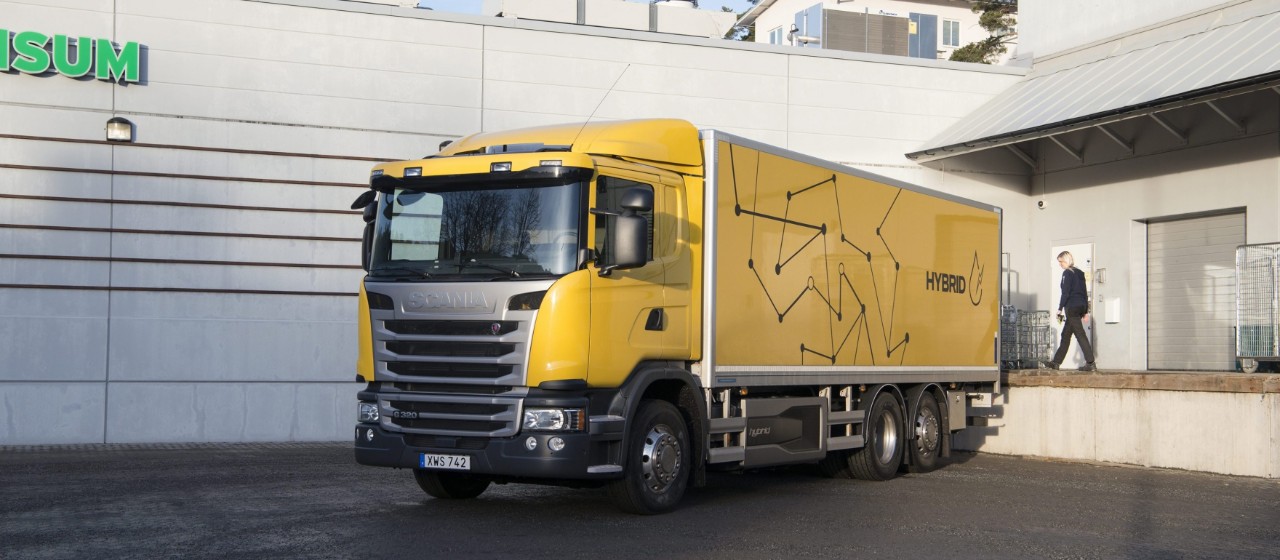
Scania electrification projects: from hybrids to wireless charging
3 MAY 2017
Scania is working on several projects to help increase the use of electrification technology within both urban and long-haul transport. All Scania’s hybrid vehicles are Euro 6 certified.
Tractor with a hybrid electric powertrain
Swedish coffee roaster Löfbergs recently put a hybrid electric truck into operation. The Scania P 320 tractor drives on electric power for nearly two kilometres on just a ten-minute charge, lowering the fuel costs by 18 percent and making it possible to perform silent deliveries without disturbing residents. In parallel with the electric battery, the truck runs on Hydrotreated Vegetable Oil (HVO). The combination reduces carbon emissions by more than 90 percent in comparison with conventional diesel.
Battery electric city bus
At the end of 2017 Scania will start field tests of battery-powered electric buses in the northern Swedish city of Östersund. The three Scania Citywide LF buses – with an additional three to be added during 2019 – will be charged through a roof-mounted pantograph at two charging stations at both ends of the 14-kilometre bus line. With a 10-minute charging time, the buses will run every 15 minutes for a total of 100 journeys each day.
Hybrid truck for quiet deliveries
Scania’s 18-tonne distribution truck can operate solely on electric power for up to two kilometres. The powertrain has an electric motor that delivers 130 kW (174 hp). Electric operations are primarily intended for city distribution in noise sensitive areas or where exhaust fumes must be avoided. The truck was awarded the prestigious German prize Green Truck Future Innovation 2016 by the leading trade magazine Verkehrsrundschau.
Breakthrough for hybrid city bus
With the launch of the hybrid powered Scania Citywide bus in 2015, Scania took another step towards carbon neutral transport solutions. The hybrid unit, comprising an electric motor and automatic clutch, is located between the engine and gearbox. The combustion engine runs on up to 100 percent biodiesel, providing CO2 savings of 60-65 percent. 2016 saw a major commercial breakthrough, when Scania started delivering 51 of these buses to the city of Madrid.
World’s first electric road
In June 2016, the world’s first electric road for heavy goods traffic was inaugurated near the Swedish city of Gävle. A Scania electrically-powered truck now operates the route, in open highway traffic, using conductive technology developed by Siemens. The truck operates as an electric vehicle when on the electrified road lane and as a Euro 6-certified hybrid vehicle running on biofuel at other times, such as when overtaking.
Wirelessly charged city bus
In December 2016, a Scania electric hybrid city bus, equipped with wireless inductive technology, was inaugurated in Scania’s hometown of Södertälje, as part of a joint research project between Scania and the KTH Royal Institute of Technology in Stockholm. The batteries are wirelessly charged while the bus stands at the terminal stop, providing it with the power it needs to complete its 10 km route in just seven minutes.
Solar-cell produced hydrogen
Together with Asko, Norway’s largest convenience goods wholesaler, Scania will start testing trucks with an electric powertrain in which the electrical energy is converted from hydrogen gas in fuel cells on board the vehicles. The hydrogen gas will be produced locally, using solar cells. The three-axle 27 tonne trucks will run in distribution service with distances of almost 500 km.